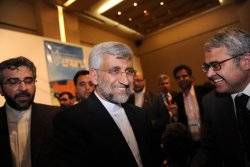Iran and Western powers have agreed to hold another round of talks on Tehran’s nuclear programme after a meeting in the Turkish city of Istanbul that was described as "useful" and "constructive".
Catherine Ashton, the European Union's foreign policy chief, told reporters the five permanent members of the United Nations Security Council and Germany would meet the Iranian delegation again in the Iraqi capital Baghdad on May 23.
The West suspects that Iran is enriching uranium to build a nuclear bomb, but Tehran says its nuclear programme is for civilian purposes only.
Ashton said the talks on Saturday, the first since the collapse of similar negotiations in early 2011, were a step towards a "sustained process of serious dialogue".
"We expect that subsequent meetings will lead to concrete steps towards a comprehensive negotiated solution, which restores international confidence in the exclusively peaceful nature of the Iranian nuclear programme," she said.
Ashton said that the next round of talks would be preceded by a preparatory meeting of deputies.
Earlier, a diplomat close to the negotiations had described Saturday's talks as "completely different" from previous meetings, with no pre-conditions set by the Iranian delegation.
The diplomat said Saeed Jalili, the leader of the Iranian delegation, steered clear of the preconditions he had set at the last meeting in early 2011.
"He seems to have come with an objective to get into a process which is a serious process, which is about what we want to talk about," said the envoy, who spoke on condition of anonymity. "I would say it has been a useful morning's work."
Another diplomat, who also requested anonymity, described the atmosphere as "positive".
"I would say there was a very constructive atmosphere compared to last time ... generally a positive vibe,'' he said. "The principle seems to be there for future negotiations.''
The talks brought together the United States, Russia, China, Britain and France. Along with Germany, the five UN Security Council members are collectively known as the P5+1.
Al Jazeera's Paul Brennan, reporting from Istanbul, said the sources he had spoken to told him that "although there were no major breakthroughs, [none] had been expected".
'Concrete proposals'
The last round of talks in January 2011 collapsed without agreement on any issues.
Ashton said they set out to see whether Iran was "serious about moving towards a sustained process".
She said the talks focused on the way forward and the process by which concrete proposals would get to the table.
Ahmet Davutoglu, the Turkish foreign minister who is hosting the meeting, said after meeting Jalili on Friday that he anticipated good news by the end of the meeting.
Both sides have said they are ready to work towards resolving the deepening dispute over the disputed nuclear programme.
"For their own reasons, each side wants to give diplomacy a chance at this point, to start a process rather than to force a quick fix," said analyst Michael Adler at the Woodrow Wilson International Center for Scholars.
One Western diplomat said Saturday's discussions were unlikely to go into detailed issues, saying the immediate objective was finding enough common ground and signs of willingness to co-operate.
Iran said prior to the meeting that it would propose "new initiatives" in Istanbul, but it was unclear whether that meant it was prepared to discuss curbs to its controversial uranium enrichment programme.
New sanctions
Western officials have made clear their immediate priority is to convince Tehran to cease the higher-grade uranium enrichment it began in 2010. It has since expanded that work, which some analysts say could be a move towards developing nuclear weapons.
Iran has signaled some flexibility over halting its enrichment to a fissile purity of 20 per cent, compared with the five percent level required for nuclear power plants, but also suggests it is not ready to do so yet.
Iranian leaders would probably expect to be rewarded with an easing of sanctions if they agreed to scale back their sensitive nuclear work, but Western officials say this issue was not up for negotiation in Istanbul.
"Stopping 20 per cent enrichment would be seen as a gesture to start negotiations, not to lift sanctions," one diplomat at the talks said.
Mohammad Marandi, a professor at Tehran University, told Al Jazeera that Iran was "enriching uranium at 20 per cent for peaceful purposes".
"They want to produce fuel for the Tehran nuclear reactor," he said.
"They [the West] are using the nuclear programme as an excuse to put pressure on Iran. If it wasn’t the nuclear programme it would be something else."
PHOTO CAPTION
Iran's chief nuclear negotiator Said Jalili leaves after a press conference in Istanbul.
Aljazeera


 Home
Home Discover Islam
Discover Islam Quran Recitations
Quran Recitations Lectures
Lectures
 Fatwa
Fatwa Articles
Articles Fiqh
Fiqh E-Books
E-Books Boys & Girls
Boys & Girls  Articles
Articles










